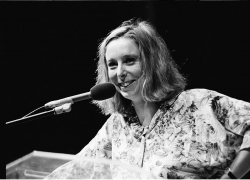TW Column by Emily Toth
Literary Gossip from Our Intrepid Reporter
-
got naked and rode up and down the hotel elevator in a North Dakota winter?
-
invited the panel host to “come flirt with waitresses”?
-
attributed early success and big sales to “I’m photogenic”?
-
required a single pink spotlight for a reading?
-
complained about dental pain?
Read on, and you will know all!
One of the first famous writers I ever met was Denise Levertov, the pacifist poet who came to do a reading when I was teaching at Penn State in the late 1970s. As the only women’s studies teachers in the whole school, my colleague Audrey and I got to dine with her. We fretted a lot about what to wear and what we’d say. We were awestruck.
Levertov turned out to be charming, an easy-to-talk-to companion (many writers aren’t), but she had only one thing on her mind. She’d had some dental work, and her jaw was hurting, and she had to tell us about it, in vivid detail. I don’t recall the details, of course—but I do remember being a bit disappointed. I wanted wisdom, not wisdom teeth. Audrey and I had imagined that when we met a great writer, we’d be riveted by her witty stories, and we’d learn the secret handshake that would enable us, too, to be literary stars.
I’ve since learned that most writers are shy. To be a show-off, you have to create a persona and a repertoire.
When Truman Capote spoke in 1976 at the University of North Dakota (where I was a professor), he required a pink spotlight as his sole illumination. He wore a large-brimmed black hat and black clothes, and he looked like a jovial, round, pink baby.
He told the story he always told at readings—about the hostess who’s out of the room when her dog bounds off a third-story balcony, chasing a ball thrown by a guest. The guest, wanting to cover his tracks, asks his hostess in tones of deep compassion, “Have you noticed lately that your dog’s been depressed?”
 When the audience hooted, Capote told us it was a sad story and not a funny one—whereupon the lights went up and the back curtain did a swan dive. It seems that Larry Woiwode, another visiting author, had drunk more than he should because of his own terrible shyness. In a fit of professional jealousy, he’d smashed a glass or two backstage and then attacked the curtain.
When the audience hooted, Capote told us it was a sad story and not a funny one—whereupon the lights went up and the back curtain did a swan dive. It seems that Larry Woiwode, another visiting author, had drunk more than he should because of his own terrible shyness. In a fit of professional jealousy, he’d smashed a glass or two backstage and then attacked the curtain.
Capote seemed unfazed.
At the after-party, Woiwode passed out, while Capote regaled us with tales of the Charles Manson women, including Susan Atkins, “who was the hairiest woman I’ve ever seen. Hair front and back. Over her face. Everywhere.” (I keep meaning to look up her picture.) Capote was funny and engaging, and we all wanted to snuggle up and hear his stories and be his love bunny. He went home alone, of course.
But I’m not here to pass judgment. I’m a reporter. I gather the news.
I also wanted, early in life, to be the kind of bestselling writer whose books became “major motion pictures.” In my series of day jobs as a university professor, I’ve had academic colleagues who wanted to be renowned literary critics. But I dreamed of the movies, probably because my favorite girlhood reads were Gone with the Wind and Peyton Place. I liked action, fast pacing, tempestuous passions, anything cinematic.
Ann Beattie had just sold a book to the movies (Chilly Scenes of Winter) when she came to speak at Penn State in 1980. Her prose style is minimalist, and my students would ask, “What the hell—if anything—happened in this book?”
When she visited my class, Beattie also wondered aloud about why anyone would read her stories: “My characters are all fucked up,” she said.
But at dinner afterward, she told me about her big breakthrough. A photographer had come to her apartment to take a few pictures for the New York Times Book Review and had become unglued with delight at the sight of Beattie’s outfit: a striped boatneck pullover and skinny jeans. The photographer’s full-length photo dominated the review of Beattie’s book in the Times, and so—by her own account—“that’s how I made it.”

That was discouraging to me. I began studying women writers’ photos in the Times, and the successful literary ones did all look like Ann Beattie or Joyce Carol Oates: very thin, big-eyed, wistful, soulful. I looked more like Colleen McCullough, the big, jolly muu-muu-wearing author of The Thorn Birds. It was clear that I wouldn’t be a success in the world of literary fiction.
Popular romance writers, though, look more like me, and they’re a pleasure at literary lunches. They dive into the food with gusto. They enjoy sensuality. They talk dirty.
And so does Dorothy Allison, author of Bastard Out of Carolina. When she came to read in New Orleans a decade ago for the Tennessee Williams Literary Festival, she already had a following for her humor and her grit. Her characters are tough cookies, poor white Southern women like those in her family, often feminists without necessarily knowing it. Her characters are resilient, and so is she.
The plumbing didn’t work in her hotel overnight—a disaster for more finicky souls. But she bonded with other women writers, and they somehow all managed to come to our panel (I was the chair) full of energy and enthusiasm. She lit up the stage, and one of my happiest moments was at the end of the panel, when she winked and said to me, “Wanna go flirt with some waitresses?”
She was also very kind to her audience—unlike some authors who like to shock or insult the customers. Visiting authors at the University of North Dakota writers’ conferences tended to go a little crazy. Maybe it was the cold, cold weather, the absence of visual stimulation, the dark winter days, or the fact that the natives mostly looked alike, had the same names, and rarely spoke.
Some writers went insanely theatrical to get a rise out of the locals. One year, Beat poet Gregory Corso decided to ride the hotel elevator, up and down, up and down, stark naked. It was freezing, and I suppose he was freezing. But since North Dakotans were always polite observers, that’s what they all did. No one called the police or security guards. People watched until he stopped. Then they zipped up their parkas, put on their gloves, threw their big scarves around their necks, and headed out into the icy night.
There are also writers who behave naughtily but must remain nameless for now. One is a woman with a long writing career and many husbands. When she goes to conferences as a visiting author, she always picks up a young man for the night. When she appears with him the next morning for the conference breakfast, she always wears bright red.
What I really want to know—this is my writer’s curiosity—is how she initiates the event. Does she pick him out of the audience, as Cher reportedly did in her younger days, and tell her underlings to “Have him washed and brought to my tent”? I really want to know.
 I would love to gossip about all this with my all-time favorite celebrity author, John Waters.
I would love to gossip about all this with my all-time favorite celebrity author, John Waters.
In my nerdy youth, I was in the small audience of sweltering souls for the premiere of his Multiple Maniacs, a wonderfully trashy, blasphemous little black-and-white terror, shown in the Unitarian Church basement in Baltimore because the Maryland Censor Board wouldn’t allow it in movie theaters. A drag queen had sex with a lobster, and there were many other miracles that I’d never imagined before and have never seen since.
Years later—in 2007—I got the chance to worship John Waters in person. By then known as “The Pope of Trash,” he spoke at the Tennessee Williams Literary Festival in New Orleans and, out of the blue, started praising Peyton Place and its author’s great biographer, Emily Toth.
“That’s me!” I howled and jumped out of the audience. I swooned, and afterward we got to chat and giggle, and I have our picture on my Facebook page. He had exactly what I want in a celebrity author, or in anyone worth knowing or reading: gossip, humor, and new information.
I was also fascinated to see that his perfect mustache is drawn on, with a pencil.
With celebrity authors, you always learn something new when you see them in person. Many are painfully introverted, and they’re so unused to speaking that their voices sound hollow. One literary author couldn’t eat more than yogurt before a reading, lest she get sick with stage fright. I’ve heard of drunken behavior (Robert Lowell used to pee in mailboxes), but I’ve never heard of authors trashing hotel rooms the way rock stars do. Maybe I don’t have the right sources.
But what if all the rock stars who’ve produced memoirs recently—Keith Richards, Eric Clapton, Steven Tyler, Pete Townshend, Neil Young—got together at a writers’ conference?
I’d love for John Waters to film it. No one else has the sensibility to bring out all the sordid truths we really need to know.
Art Information
- "Paparazzi Statue" © Mark Turner; Creative Commons license
- Photo of Truman Capote by Jack Mitchell; Creative Commons license
- Photo of Ann Beattie at the Miami Bookfair International, 1986; courtesy of Miami Dade College Archives
- Photo of Emily Toth with John Waters © Bruce Toth
 Emily Toth is a contributing writer at Talking Writing, where her column “Nothing but the Toth” appears regularly.
Emily Toth is a contributing writer at Talking Writing, where her column “Nothing but the Toth” appears regularly.She notes: “As a visiting writer, I’ve had my own weird encounters. When my cowriters and I were promoting The Curse: a Cultural History of Menstruation, an audience member denounced us for our ‘hopelessly sexist’ subject. ‘You should be writing about something universal, like farts,’ she hissed.
“When I’ve spoken as Ms. Mentor, my academic-advice-giving persona, women have followed me into the bathroom and slipped requests for advice under the stall door. And, of course, there are fans who insist that you must have a pseudonym they’ve heard of. I once whispered, ‘I’m really John Grisham.’”

